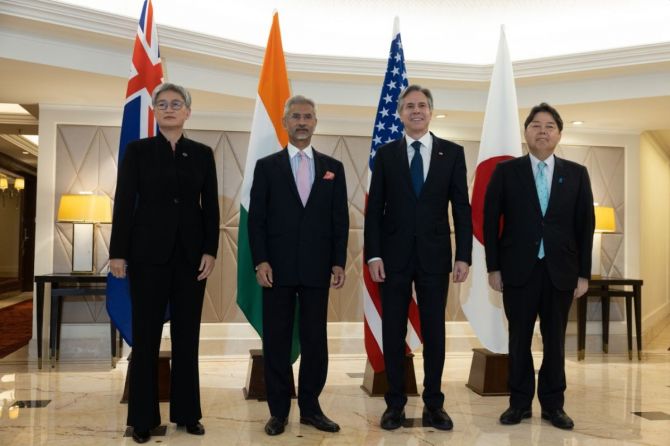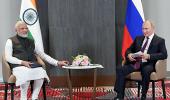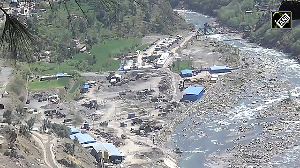The top diplomats of Quad nations on Friday denounced as "inadmissible" any use or threat of use of nuclear weapons in the Ukraine war and strongly opposed any "unilateral actions" that seek to change the status quo in the South and East China Seas, a region that has witnessed increasing Chinese military offensive.

The foreign ministers of Quad, after an India-hosted meeting, also announced that a Quad working group on counter-terrorism would be established to explore measures to combat new and emerging forms of terrorism, radicalisation and violent extremism.
US Secretary of State Antony Blinken, his Japanese counterpart Yoshimasa Hayashi and Australia's Penny Wong were hosted over breakfast by External Affairs Minister S Jaishankar under the framework of Quad.
They also reaffirmed the grouping's commitment for a free and open Indo-Pacific and said it strongly supports the rule of law, sovereignty, territorial integrity and peaceful settlement of disputes, in comments seen as an oblique message to China.
On the Ukraine conflict, the Quad foreign ministers emphasised that the rules-based international order must respect sovereignty, territorial integrity, transparency and peaceful resolution of disputes.
"We continued to discuss our responses to the conflict in Ukraine and the immense human suffering it is causing, and concurred that the use or threat of use of nuclear weapons is inadmissible," a joint statement issued by the four top diplomats said.
"We underscored the need for a comprehensive, just and lasting peace in Ukraine in accordance with international law, including the UN Charter. We emphasised that the rules-based international order must respect sovereignty, territorial integrity, transparency and peaceful resolution of disputes," they said.
There have been apprehensions among Western powers that Russia may consider the nuclear option. However, Russia has rejected such apprehensions.
Except India, the other Quad member nations -- the US, Japan and Australia -- have been severely critical of Russia's invasion of Ukraine. The US has been leading Western efforts to punish Russia for the invasion.
Hours after the Quad meeting, Blinken said at the Raisina Dialogue that allowing Russia to wage war against Ukraine with impunity would be a message to "would be aggressors" everywhere that they may be able to get away with it too.
"If we allow with impunity Russia to do what it's doing in Ukraine, then that's a message to would be aggressors everywhere that they may be able to get away with it too," he said.
"Good to break bread with my Quad colleagues in New Delhi today. Together, we recognize the Indo-Pacific region will shape the trajectory of the world in the 21st century and are committed to safeguarding its peace, stability, and growing prosperity," Blinken tweeted.
Seen as a veiled message to China, the Quad foreign ministers said they strongly oppose "any unilateral actions that seek to change the status quo or increase tensions" in East and South China Seas.
"We express serious concern at the militarisation of disputed features, the dangerous use of coast guard vessels and maritime militia, and efforts to disrupt other countries' offshore resource exploitation activities," they said without naming China.
The Quad foreign ministers said the Quad Maritime Security Working Group meeting will be hosted by the US in Washington in March.
In their statement, the ministers also welcomed the progress made under the Indo-Pacific Partnership for Maritime Domain Awareness (IPMDA).
"We recognise that peace and security in the maritime domain underpins the development and prosperity of the Indo-Pacific, and reiterate the importance of respect for sovereignty, consistent with international law," they added.
They reiterated the importance of adherence to international law, as reflected in the UN Convention on the Law of the Sea (UNCLOS), to meet challenges to the maritime rules-based order.
The Quad foreign ministers also "unequivocally" condemned terrorism and violent extremism in all its forms and denounced the use of terrorist proxies and financial or military support to terrorist organisations which could be used to launch or plan terrorist attacks, including transnational and cross-border strikes.
They reiterated their condemnation of terrorist attacks, including 26/11 Mumbai strikes, which claimed lives of citizens from all Quad countries, and Pathankot attacks.
"We are pleased to announce the establishment of the Quad working group on counter-terrorism, which will explore cooperation amongst the Quad, and with Indo-Pacific partners, to counter new and emerging forms of terrorism, radicalisation to violence and violent extremism," they said in the statement.
"We look forward to its first meeting in the United States in 2023 to continue our discussions on this global issue."
The Quad foreign ministers said they are committed to working together with the regional and international partners to promote accountability for the perpetrators of terrorist attacks, including through designations by the UN Security Council's 1267 sanctions committee.
"In this regard, we express our concern at attempts to politicise the working of the UNSC Sanctions Regimes and call on all states to maintain the transparent, objective and evidence based working methods of UNSC Sanctions Committees," the statement said.
It said the ministers noted with deep concern that terrorism has become increasingly diffuse, aided by terrorists' adaptation to, and the use of emerging and evolving technologies such as unmanned aerial systems (UAS) and the internet.











 © 2025
© 2025